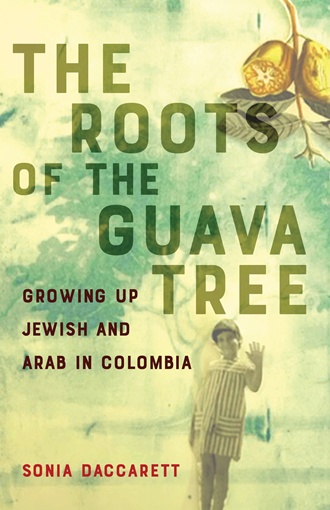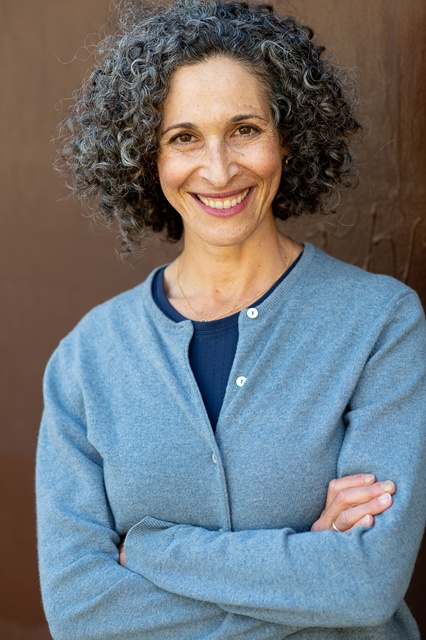People are not one-dimensional but shaped by the collective experiences that have a profound impact on their lives. I love memoir, because I’m interested in other people’s experiences…which seem to be so different but, in the end, we all return to our shared humanity and our need to belong, to be loved and to understand who we are.
Sonia Daccarett – 12 August 2025
The Back Flap
Sonia Daccarett grew up with a Jewish mother and a Christian Palestinian father in Colombia during the drug-war 1980s. When she asks her parents questions about their family’s ethnicity and religion they answer evasively, defining their family religion and ethnicity as “nothing.” Grandparents and family members who speak Yiddish, Hebrew, and Arabic and fled from places called the Austro-Hungarian Empire, Russia, Bethlehem, and the Ottoman Empire, does not sound like “nothing” to Sonia.
At the same time, Sonia grapples with her American education at school. She is both enchanted and challenged by the tropical landscape of her childhood in a remote suburb of Cali, which is rapidly changing as cocaine trafficking and drug cartels begin to dominate the city’s life.
As she tries to discover what her family is, Colombia begins unraveling around her through violence, kidnappings, and the death of acquaintances and friends. At the same time, her parents’ marriage and their personal identities are rocked by the faraway Israeli invasion of Lebanon in 1982. Soon, she will have to decide whether to stay in Colombia with her family or leave them behind to find the answers she seeks.
About the book
What is the book about?
The book is a memoir about a young girl (me) struggling to understand her identity as the daughter of a Jewish mother and Christian Palestinian father, coming of age in Colombia as increasing violence and the instability of the 1980s engulf her country.
When did you start writing the book?
I just started writing to record memories and thoughts that gradually turned into a book.
How long did it take you to write it?
Seven years, in an extremely non-linear way.
Where did you get the idea from?
A dream.
Were there any parts of the book where you struggled?
The entire book was hard, pulling out memories and deciding which ones would go in the book, and which ones did not necessarily serve the narrative. I really wanted to capture the humanity of all the characters – who happen to be my loved ones and friends – with fairness and compassion. I had to think hard about what made them human, and why they did the things they did.
What came easily?
The memories and feelings came flooding in but capturing them into words was not always easy.
Are your characters entirely fictitious or have you borrowed from real world people you know?
This is a memoir, so all the characters are real, but names and identifying characteristics have been changed.
We all know how important it is for writers to read. Are there any particular authors that have influenced how you write and, if so, how have they influenced you?
I love the memoir genre broadly, but I think I respond most to memoirs about identity, especially where the author is interrogating identity, or a mystery, or a family secret. The Color of Water by James McBride is one of my favorites, and I think he does a masterful job of bringing his mother’s story to light while also counterbalancing her story with his own. Dani Shapiro’s Slow Motion about her family foreshadows a revealed secret in her subsequent memoir Inheritance. Beyond memoir, I also read all kinds of books, particularly writers that delve deeply into identity and personal history. I love Jumpa Lahiri’s poignant, haunting writing about the dislocation and discoveries of outsiders and immigrants. I greatly admire Chimamanda Ngozi Adichie’s novels, particularly addressing complex and unexpected cultural intersections and identities. I also love contemporary Colombian writers like Juan Gabriel Vasquez and Laura Restrepo, who write masterfully about the human and societal impacts of contemporary Colombian history, among other topics.
Do you have a target reader?
My imagined audience is anyone who grew up in a complicated family, which I think means everyone! People are not one-dimensional but shaped by the collective experiences that have a profound impact on their lives. I love memoir, because I’m interested in other people’s experiences…which seem to be so different but, in the end, we all return to our shared humanity and our need to belong, to be loved and to understand who we are. I wanted to share my story of growing up in a family with a unique and historically challenging cultural identity to inspire others to think about and share their own stories.
About Writing
Do you have a writing process? If so can you please describe it?
My process is just forcing myself to sit down to write and having the great fortune of being in partnership with a fellow friend and writer who holds me accountable. We support and encourage each other’s work in ways that have been invaluable to me.
Do you outline? If so, do you do so extensively or just chapter headings and a couple of sentences?
I tend to write as the ideas flow and then return to the content many times to shape and edit.
Do you edit as you go or wait until you’ve finished?
Both, depending on how fresh material is flowing or how complete a section or chapter is.
Do you listen to music while you write? If yes, what gets the fingers tapping?
I love music but find it distracting when I write.
About Publishing
Did you submit your work to Agents?
No.
What made you decide to go Indie, whether self-publishing or with an indie publisher? Was it a particular event or a gradual process?
I had the great luck of finding and liking She Writes Press (SWP), and having them like my work back.
Did you get your book cover professionally done or did you do it yourself?
The SWP team designed the cover with feedback and direction from me. The process was a good collaboration.
Do you have a marketing plan for the book or are you just winging it?
I have a marketing plan.
Any advice that you would like to give to other newbies considering becoming Indie authors?
Write the best book you can!
End of Interview:
Get your copy of The Roots of the Guava Tree from Amazon US.



